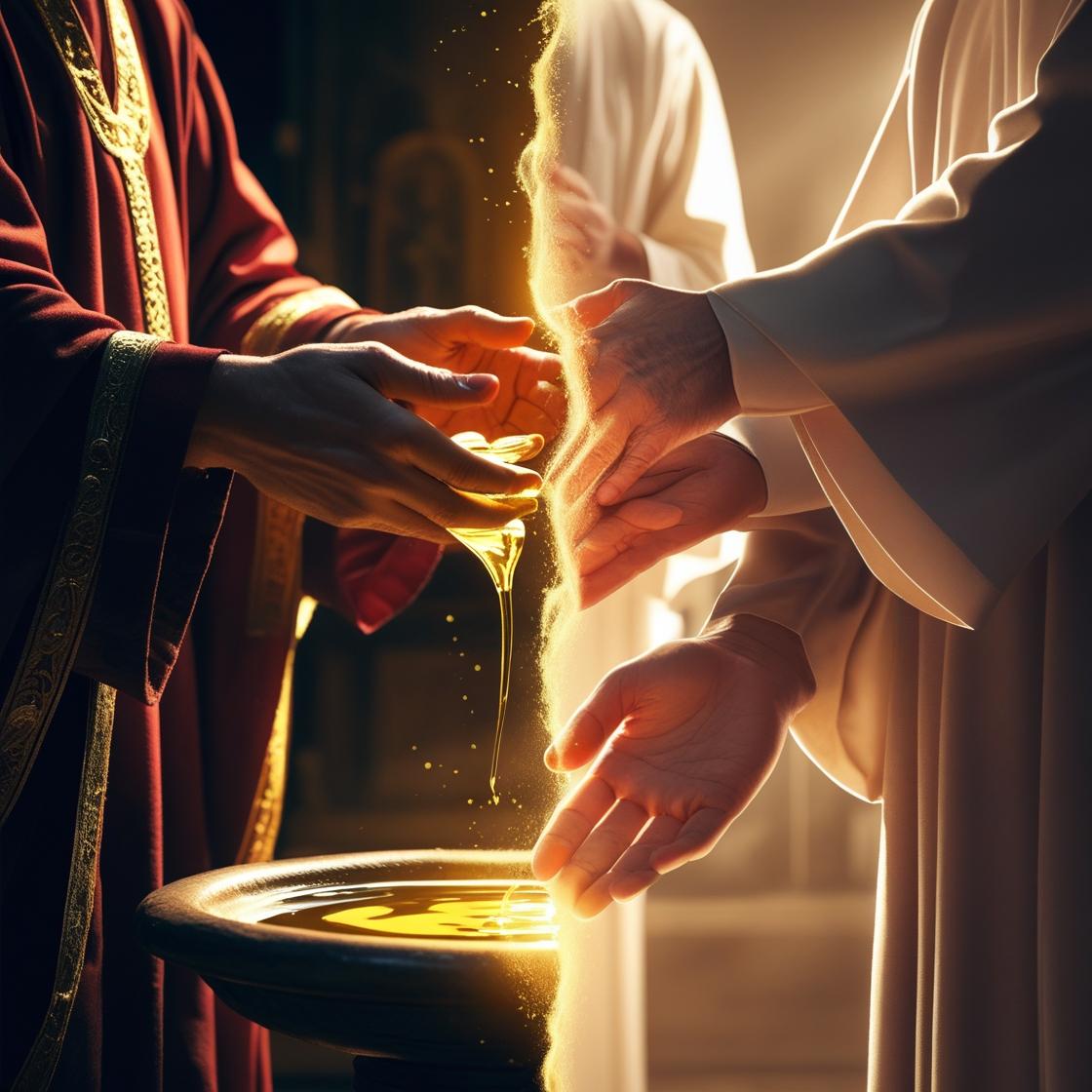If you’ve heard the word “anointed” in church or while reading the Bible, you might wonder what it means. In simple terms, to be anointed is to be chosen, set apart, and empowered by God for a special purpose.
The way this happens changes between the Old and New Testaments in a beautiful way that shows how God’s plan unfolded. Let’s break it down logically.
Part 1: Anointing in the Old Testament was a Physical Act
In the first half of the Bible, anointing was a very physical and visual ceremony.
How it worked:
A prophet or priest would pour a special, sacred oil on someone’s head. This wasn’t just any oil; it was a unique mixture God Himself commanded to be made (Exodus 30:22-33).
Then the Lord said to Moses, 23 “Take the following fine spices: 500 shekels[a] of liquid myrrh, half as much (that is, 250 shekels) of fragrant cinnamon, 250 shekels[b] of fragrant calamus, 24 500 shekels of cassia—all according to the sanctuary shekel—and a hin[c] of olive oil. 25 Make these into a sacred anointing oil, a fragrant blend, the work of a perfumer. It will be the sacred anointing oil.
This physical act was a powerful symbol. It was like God putting His visible stamp of approval on a person.
Who was anointed?
God didn’t anoint everyone. He specifically anointed people for three key leadership roles in Israel:
- Kings: To rule with God’s authority.
- Example: The prophet Samuel anointed a young shepherd named David to be the next king (1 Samuel 16:13). The moment the oil touched him, the Bible says God’s Spirit came upon him powerfully.
- Priests: To serve in God’s temple.
- Example: Aaron, the brother of Moses, was anointed as the first high priest (Exodus 30:30). This set him apart for the holy work of offering sacrifices to God.
- Prophets: To speak God’s words to the people.
- Example: God told the prophet Elijah to anoint Elisha to take his place (1 Kings 19:16).
What we learn is that in the Old Testament, anointing was external, physical, and for a specific job. It was for a select few who would lead God’s people. The oil symbolized the power of the Holy Spirit coming upon them to do their job. However, this empowering Spirit could sometimes leave, as it did with King Saul.

Part 2: Anointing in the New Testament is a Spiritual Reality
When we get to the New Testament, something incredible happens. The idea of anointing shifts from a physical ceremony for a few people to a spiritual reality for everyone who follows Jesus Christ.
How it worked:
This new anointing isn’t done with man-made oil. It is done directly by God through the Holy Spirit through the Ultimate Anointed One: Jesus Christ.
First, Jesus is introduced as the ultimate anointed one. The word “Christ” isn’t His last name; it’s a title. It means “The Anointed One” or “The Messiah.”
- At His baptism, the Holy Spirit came down on Him like a dove (Matthew 3:16). This was His divine anointing to launch His mission of preaching, healing, and ultimately saving humanity.
- Jesus Himself said He fulfilled the prophecy of Isaiah: “The Spirit of the Lord is on me, because he has anointed me to proclaim good news to the poor…” (Luke 4:18).
Anointing is for Everyone Who Believes
Here’s the amazing part: because Jesus was anointed, He shares that anointing with us.
The New Testament makes it clear that God anoints every single Christian.
- 2 Corinthians 1:21-22 says, “Now it is God who makes both us and you stand firm in Christ. He anointed us, set his seal of ownership on us, and put his Spirit in our hearts as a deposit…”
- 1 John 2:27 says, “As for you, the anointing you received from him remains in you…”
What we learn is that in the New Testament, anointing is an internal, spiritual, and universal experience for every believer.
It’s not about a job title like king or priest; it’s about your identity as a child of God. This anointing means God’s Spirit lives inside you, guiding you, teaching you, and empowering you to live a Christian life.
Simple Summary: Then vs. Now
| Old Testament Anointing | New Testament Anointing | |
|---|---|---|
| How? | With physical oil | With the Holy Spirit |
| Who? | A few select leaders | Every believer in Jesus |
| Purpose? | For a specific job (to rule, serve, or speak) | For a new identity (to know God and be empowered to live for Him) |
| Permanence? | Could be lost | Is permanent – God’s Spirit seals us through the Holy Ghost |
The story of anointing shows the progression of God’s plan for mankind:
- In the Old Testament, God worked through a chosen few, anointing them with oil to point forward to the ultimate Rescuer, the Messiah, who would come.
- After the death and resurrection of Christ and until now, the Messiah, Jesus, has come. He was filled with the Spirit without limit, and after He rose from the dead, He poured out that same Spirit on all His people.
So, if you are a follower of Jesus, be encouraged today: You are anointed. You have God’s Spirit living in you, empowering you not for a political throne, but for the everyday mission of representing Christ right where you are.
Prayer:
Oh, Lord, fill me with Your Anointing in Jesus’ mighty name







